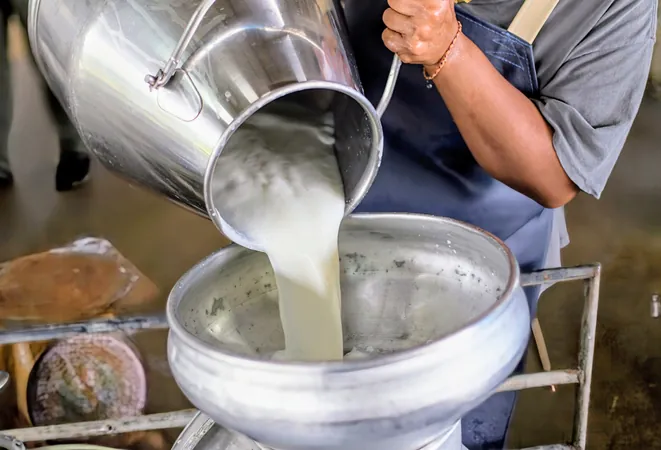
Shocking Study Reveals Raw Milk Could Harbor Flu Viruses for Days!
2024-12-15
Author: Arjun
Shocking Study Reveals Raw Milk Could Harbor Flu Viruses for Days!
Raw milk, celebrated by many for its purported health benefits, is now under scrutiny due to alarming findings from a recent Stanford University study. As more people turn to what they believe is a natural and nutritious choice, the risks associated with consuming raw milk are becoming increasingly apparent.
The study discovered that the flu virus can remain viable in refrigerated raw milk for up to five days, raising concerns amidst current bird flu outbreaks in livestock. Professor Alexandria Boehm, the study’s senior author, stated, “This work highlights the potential risk of avian influenza transmission through raw milk consumption and underscores the critical importance of pasteurization.”
Risky Business: The Growing Raw Milk Trend
With over 14 million Americans indulging in raw milk each year, the popularity of non-pasteurized products continues to grow. Advocates claim that raw milk retains essential nutrients, enzymes, and probiotics beneficial for immune and gut health. However, health agencies, including the FDA and CDC, warn of the significant health threats posed by raw milk, linking it to over 200 outbreaks of illness due to harmful pathogens like E. coli and Salmonella. These pathogens are particularly dangerous for vulnerable populations, including children, pregnant women, the elderly, and individuals with weakened immune systems.
Unmasking the Flu Virus in Dairy
Researchers investigated how long the H1N1 PR8 flu virus can remain infectious in raw cow's milk when stored at typical refrigeration temperatures. Their findings are concerning: the virus can survive for as long as five days. Co-lead author Mengyang Zhang emphasized the implications of these results, stating, “The persistence of infectious influenza virus in raw milk raises serious concerns about potential transmission pathways.”
Moreover, the study noted that viral RNA, while not harmful by itself, can persist in raw milk for at least 57 days. The expert team indicated that this complicates food safety evaluations and environmental health monitoring. Although pasteurization effectively kills infectious flu viruses and reduces viral RNA levels by around 90%, some residual traces still pose questions about food safety and public health.
The Urgent Need for Enhanced Monitoring
Flu viruses infect over 40 million people annually in the U.S., resulting in over 50,000 deaths. They have the potential to jump from animals to humans, as witnessed during the swine flu pandemic of 2009-2010, which infected up to 1.4 billion globally. Although bird flu has not yet emerged as a significant threat to public health, increasing cases among dairy cattle underline the urgent necessity for improved monitoring and surveillance strategies to prevent potential outbreaks tied to raw milk products.
Professor Boehm also highlighted innovative methods of tracking zoonotic pathogens, such as utilizing wastewater analysis to detect flu activity in cattle populations. “It has been remarkable to see how our wastewater detection efforts have scaled both nationally and globally,” she remarked.
Why Pasteurization Is Non-Negotiable
The implications of this study stress the indispensable role of pasteurization in safeguarding the public’s health. As zoonotic diseases become more prevalent, it is essential for policymakers and health officials to take these findings into account to enhance food safety regulations and surveillance systems.
Though raw milk may seem appealing for its natural properties, the evidence reveals that the risks associated with its consumption far outweigh the benefits. Making informed choices about food safety—especially opting for pasteurized products—can protect our health and that of our loved ones.
Stay informed and prioritize safety as the discourse around raw milk continues—even as health trends evolve!

 Brasil (PT)
Brasil (PT)
 Canada (EN)
Canada (EN)
 Chile (ES)
Chile (ES)
 España (ES)
España (ES)
 France (FR)
France (FR)
 Hong Kong (EN)
Hong Kong (EN)
 Italia (IT)
Italia (IT)
 日本 (JA)
日本 (JA)
 Magyarország (HU)
Magyarország (HU)
 Norge (NO)
Norge (NO)
 Polska (PL)
Polska (PL)
 Schweiz (DE)
Schweiz (DE)
 Singapore (EN)
Singapore (EN)
 Sverige (SV)
Sverige (SV)
 Suomi (FI)
Suomi (FI)
 Türkiye (TR)
Türkiye (TR)